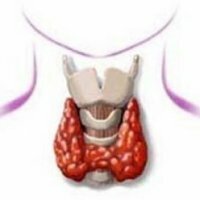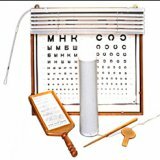Blood test for thyroid hormones

Hormones produced by the thyroid gland and pituitary gland are highly active biological substances that control the processes of metabolism of proteins, fats and carbohydrates, the work of the cardiovascular system, sexual and psychic activity, and the activity of the gastrointestinal tract. Therefore, to diagnose diseases associated with the thyroid gland, the blood test for these hormones is primarily given.
The delivery of blood for the study of thyroid hormones should be done on an empty stomach, and it is not allowed even to drink. Blood is taken from the vein. The best time to submit the analysis is about ten o'clock in the morning. In accordance with the doctor's instructions, you should limit or stop at this time taking medications containing thyroid hormones. One day before the study should be avoided as much as possible stress and physical exertion, and half an hour before the test, you should calm down.
The thyroid-stimulating hormone study is a mandatory study conducted by an endocrinologist in the diagnosis of thyroid disease. The number of TTG, not corresponding to the norm, can serve as a signal about the possible presence of hidden diseases. If there is a deficiency of this hormone, then the presence of such violations in the body as thyrotoxicosis or hyperthyroidism, as well as impairment of the pituitary gland. One of the main causes of low levels of hormone can be a trauma to the pituitary gland. If the amount of thyroid-stimulating hormone exceeds the norm, then this may be evidence of hypothyroidism, a decreased function of the adrenal glands, tumors and mental illnesses.
A trial for total triiodothyronine can be performed for the detection of hyperthyroidism, for substitution treatment with L-thyroxine and for treating goiter. A high level of triiodothyronine can be observed with thyrotoxicosis, during pregnancy, with iodine deficiency goiter and thyroid insufficiency. If a lower level of the hormone is detected, then the likelihood of too low a metabolism, also called hypothirism, is high. However, it should be remembered that in elderly people the amount of T3 is much lower, therefore when performing a blood test they use other indicators of the norm.
The study for free triiodothyronine is carried out as part of a differential diagnosis of thyroid disorders. High levels of the hormone can be observed with dysfunction of the thyroid gland, toxic goiter, nephrotic syndrome, choriocarcinoma, chronic liver diseases and other diseases. A deficiency of this hormone can be diagnosed with hypothyroidism, too much physical exertion, weight loss for various reasons and primary adrenal insufficiency.
A study on thyroglobulin is a study of the amount of protein that makes up the bulk of the thyroid gland. This type of blood test is most often performed with monitoring of thyroid cancer, in the study of chronic hepatitis and cirrhosis of the liver. Increased concentration of thyroglobulin may serve as a sign of autoimmune and chronic thyroiditis, thyroid cancer, hyperthyroidism and many other diseases.
A blood test for free and common thyroxine is one of the main tests performed in thyroid studies. An increased amount of total thyroxin can be observed in the presence of thyrotoxicosis, acute thyroiditis, hyperthyroidism, toxic goiter, and decreased - with hypothyroidism. The data obtained with this study strongly depend on a number of indirect factors, such as, for example, severe stress or the intake of oral contraceptives. If the level of free thyroxin goes beyond the norm, this is evidence that there is an increased or decreased metabolism.
All the above blood tests for more reliable results should be performed regularly, which will allow monitoring the state of the thyroid gland in dynamics. Repeated tests are carried out at the same time of day. Also, when taking tests for 1-3 days should not use iodine-containing drugs.



